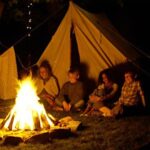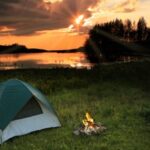Make a camping list and check it twice. Expect that something will be forgotten, and try to improvise. Don’t get stressed if you’re packing and it’s your first time out. As with any other vacation, the key to remembering the items you need to take along is to make lists. Tailor your list to your trip; you can carry more in the back of a car or in a canoe than you can in a backpack.
You can add or subtract camping gear from your trip according to how much room you have or how much weight you want to carry. Camping from a car is very different from camping from a backpack.
However long your list, resist the temptation to bring useless gear; you won’t need a portable iron, steam machine, hangers, shoe polish, or other “citified camping gear” for your encounter with the outdoors. Of course, an outdoor vacation does require some specialized equipment and supplies – you’ll find information about that camping gear throughout our articles. Then, you can make informed choices as you decide which of the items described next you’re going to need.
Nearly everyone has a friend, or at least an acquaintance, who’s familiar with some of the camping gear needed for a basic camping trip. Call on these people to help you begin your list. Who knows maybe your friend can lend you some camping equipment. The other option is to visit specialized camping stores and talk to those in the know. Explain what you’re doing, what you think you need, and how long you expect to be outdoors. Good camping outlets hire salespeople who actually go hiking, camp, and vacation outdoors on the side. Consult these people for insider’s advice on equipment and planning they may even offer tips on good hiking and camping locations in your neck of the woods.
Camping Checklists
In the fullness of time, you’ll develop your own way of organizing an outdoor camping vacation yourself. In the meantime, here are some camping checklists that you can add to and build on. As you consider bringing any of these items, always remember weight (especially if you expect to hike to a destination). Many of the items listed are nice to have, but in no way necessary for the success of a camping trip. Some seasoned backpackers would consider a few of them downright gratuitous!
Wilderness guides, nature guides, and novels are some of the extras that campers may want to take along. Expect that something will be forgotten, and try to improvise.
The Basic Camping Gear Checklist (for a weekend outing):
- Sleeping bag
- Sleeping mattress
- Tent
- Food
- Water
- Pocketknife
- First aid kit
- Flashlight
- 50-foot lengths of rope or nylon parachute cord (in bear country)
- Waterproof matches and a butane cigarette lighter
- Camp stove
- Appropriate clothes
- Insect repellent
- Sunscreen
- Topographical map of area
- Compass
- Whistle
- Toilet paper
General Camp Clothing Checklist
- Chamois shirt
- Hat, bandana, or duck-billed cap
- Head netting (can be included as part of cap, above)
- Hiking boots
- Synthetic, wool, or silk long underwear
- Quick-drying synthetic pants
- Rainwear
- Running shoes or sandals
- Shorts (lightweight synthetics can double as bathing suit)
- T-shirts
- Waterproof utility bag for clothes
- Windproof jacket
- Hiking socks
Personal Effects Checklist
- Backpack
- Compass
- Extra flashlight batteries
- Extra pair of glasses or contact lenses (with solutions)
- Full-size knife
- Garbage bags
- Matches
- Self-sealing sandwich bags
- Sunglasses
- Water container (canteen)
- Water purifier
Kitchen Checklist
- Biodegradable dishwashing detergent (optional)
- Extra stove fuel (Chapter 6)
- Fireplace grill (Chapter 6)
- Food (Chapter 6)
- Pots and pans (Chapter 6)
- Spatula
- Water carrier
Personal Hygiene Checklist
- Comb or hairbrush
- Dental floss
- Gardening trowel (for burying waste if privies are not available)
- Towelettes
- Nail clipper
- Shaving supplies
- Soap
- Toilet paper
- Towel
- Washcloth



